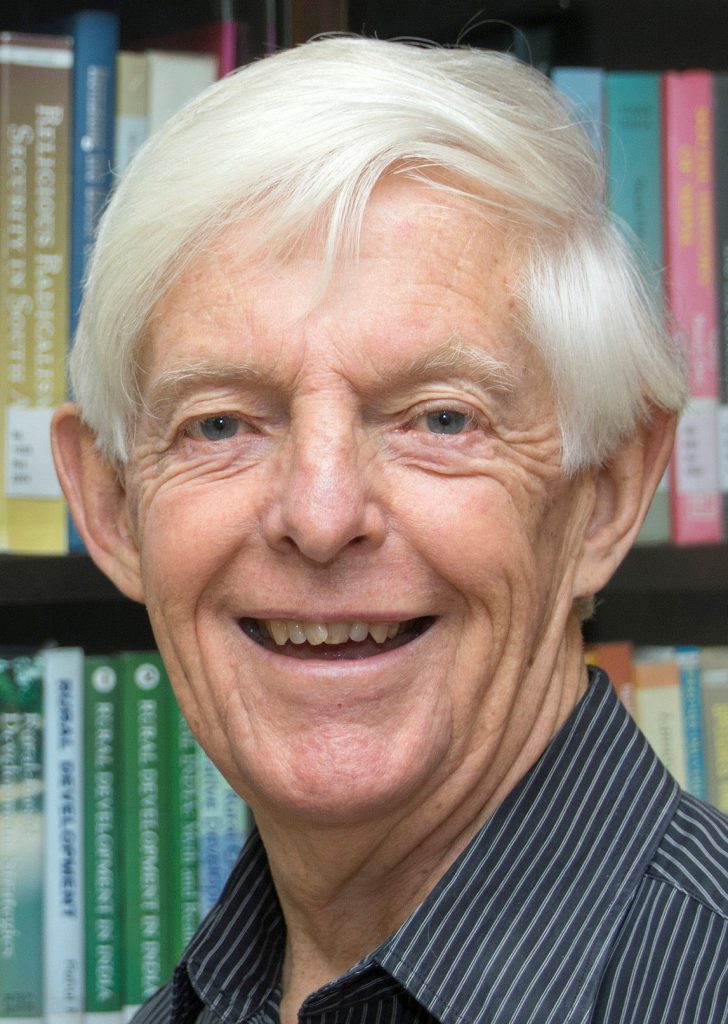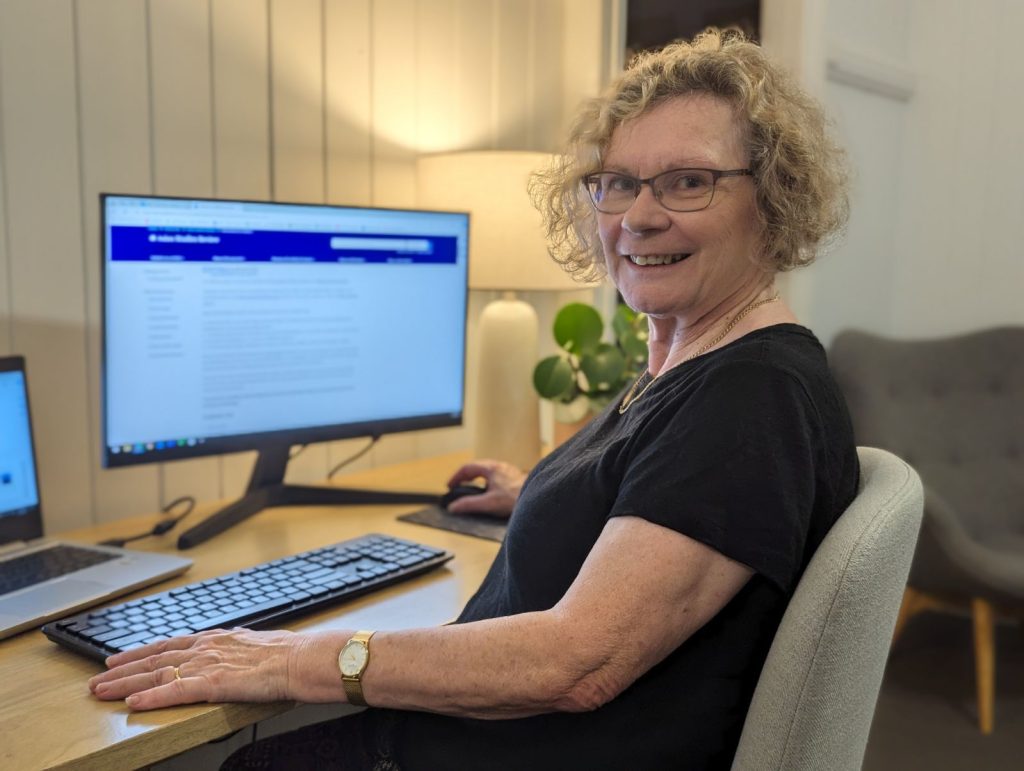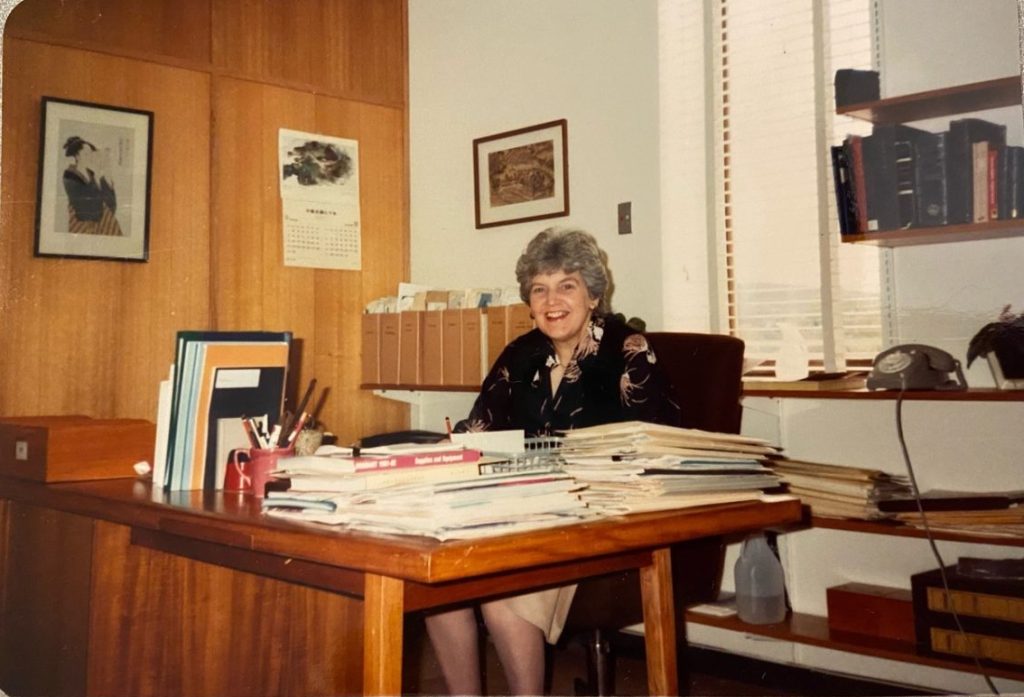The ASAA Council is pleased to announce the appointment of three new honorary life members: Emeritus Professor Robin Jeffrey, Anne Platt and Enid Bishop. These appointments are made to colleagues who have modelled exemplary service to ASAA and to the field of Asian Studies in Australia more broadly.
Robin Jeffrey

Robin Jeffrey is Emeritus Professor at the Australian National University and La Trobe University. He is also an honorary fellow at the Institute of South Asian Studies, Singapore
Robin is former Dean of the College of Asia and the Pacific at the Australian National University. He taught at La Trobe University, Melbourne from 1979 and was Professor of Politics at La Trobe from 1993-2005. While at La Trobe, Robin convened one of the ASAA’s largest Biennial Conferences in 1996, ‘‘Communications with/in Asia’’, with over 700 participants. The conference marked the 20th anniversary of the ASAA.
His special interest is India and South Asia, particularly the regions of Punjab and Kerala and the politics of media, development and pluralism. His most recent book, co-authored with Assa Doron, Waste of a Nation: Garbage and Growth in India won the ASAA’s inaugural Reid Prize for the most significant book contributing to the understanding of Asia in 2022.
He was the coordinator and leading author of the report, “Maximizing Australia’s Asia Knowledge“, published in 2002. Following its release, he was president of the Asian Studies Association of Australia from 2003-04 in which he led significant interactions with university leaders, media and government in raising awareness of the report’s key findings.
During his Presidency, Robin was active in ensuring the smooth operations of the ASAA with attention to administrative detail as well as charting strategies for the future of Asian Studies in Australia. He also applied a keen eye to preserving the history of the ASAA and recognising its key figures and events. Robin instituted the ‘life membership’ category that we now bestow upon him. His generous and wise mentoring for those coming afterwards has benefited many in the Asian Studies field in both Australia and Asia.
Former colleague Professor Kaori Okano of La Trobe, who taught with Robin some years ago, noted “Robin was a truly inspirational, passionate and engaging Asian Studies educator. I saw how much students respected and genuinely liked Robin, while teaching with him in first year Asian Studies subjects at La Trobe.”
He reflected on 20 years of Asian Studies in Australia since then in a recent Asian Currents blog post.
Robin is a Fellow of the Australia Academy of the Social Sciences and a Fellow of the Australian Academy of the Humanities. In 2022, he received the South Asia Studies Association of Australia Distinguished Long-term Contribution Award.
A message of congratulations to Robin from the community, organised by ASAA councillor Dr Nisha Thapliyal, from Dr Vaibhav Gaikwad: “Firstly, congratulations on this very well deserved recognition by the ASAA. I would like to thank you Robin for being such an important and knowledgeable source of guidance in my life. Very rarely does one come cross people who are both brilliant and humble. You embody these qualities in everything you do. Whether it is for your insights at the Dr. Ambedkar Jayanti panel discussion in Canberra, the vital role your have played in connecting me with Anish and his team at Ashaya – who now convert soft plastics into eye gear, or your blessings for my little bub Tanish- there are so many things that I will remain grateful to you for. Thank you again for everything and wish you all the best”.
Anne Platt
 The ASAA is pleased to appoint Anne Platt as an honorary life member in recognition of more than 25 years of continuous service in her role as Assistant Editor of the Asian Studies Review (ASR), the flagship journal of the ASAA. While Editors in Chief and Council members come and go, Anne has been an essential part of the life of the journal and the Association more broadly.
The ASAA is pleased to appoint Anne Platt as an honorary life member in recognition of more than 25 years of continuous service in her role as Assistant Editor of the Asian Studies Review (ASR), the flagship journal of the ASAA. While Editors in Chief and Council members come and go, Anne has been an essential part of the life of the journal and the Association more broadly.
Anne specialises in Japanese Studies and began her career at Griffith University. In the late 1980s, she began work at the Key Centre for Asian Languages and Studies (a joint venture between Griffith University and the University of Queensland, UQ). The two universities were to later develop their own niches in Asian Studies, and Anne has devoted a significant portion of her career to UQ.
Anne has been instrumental to the success of ASR for more than half of its lifetime. From 1998, she worked closely with Professor Kam Louie (then at UQ) who became Editor and transformed ASR into a formal academic journal with an international Editorial Board and a small number of Regional Editors to assist. With the journal shifting from three issues each year to four, and undertaking a transition from one publisher to another, there was a lot of work to be done, and Anne was on hand to ensure all went smoothly. Kam Louie notes that “Anne’s editorial and extensive Asian expertise was instrumental in building and maintaining ASR’s top international reputation”. She has since worked with all six Editors- in-Chief (EIC), who have all benefited immensely from her collegial professionalism.
Anne’s primary responsibilities and contribution to the journal include copyediting and proofreading each article and book review, ensuring a high quality publication. Anne has also played an important role in ASR’s adaptation to new platforms, the shifting needs of researchers, and the ever-changing nature of academic publishing. According to David Hundt, the outgoing EIC, Anne ‘has an unparalleled knowledge of ASR’s online platform (Scholar One) and has been an invaluable point of contact with our partners at the publisher (Taylor & Francis). I have been so grateful to her for taking primary responsibility for communicating with authors after the editors had handled accepted articles. Anne can be trusted to do right by everyone – authors, editors, and the publisher – and that has made my life as an editor so much easier’.
Anne Platt has been part of the ASR team during its rise to a position of high standing in Asian Studies. Figures provided by the publisher tell us that the journal’s download rate is increasing by 10 per cent year on year, its citation rates and impact factor are rising, and the number of submissions continues to reach new highs each year. Pleasingly, manuscripts from the Asian region, broadly defined, make up the vast majority of new submissions, although the journal also remains an important element of Asian Studies in Australia. ASR is a primary source of revenue for the ASAA, and enables the ASAA to fund many grants and prizes to support its members and recognise outstanding achievements.
Incoming Editor-in-Chief Dirk Tomsa is delighted that Anne has decided to continue her work with ASR for the foreseeable future. ‘When I introduced myself to the editorial board, Anne was one of the first members to respond and offer her support during the transition from David. Since I formally commenced the EIC role in January 2024, she has been extremely helpful whenever I have had questions about processes and systems. She has certainly played her part in making the handover very smooth, so I look forward to working with her in the years ahead.’
You can read more about Anne’s work directly in her recent blog for the series on Celebrating Women’s Contributions to ASAA here.
Enid Bishop (Gibson)

The ASAA is pleased to appoint Enid Bishop (Gibson) as an honorary life member in recognition of her role in the founding of the ASAA and for her years of leadership and service in the field of Asian Studies librarianship in Australia.
In the 1950s, Enid obtained her degree with a focus on classical Chinese from what was then known as the School of Oriental Languages, Canberra University College (CUC), a part of the University of Melbourne.
In 1958, Enid was hired as the Assistant Librarian at CUC to oversee and develop the Asian collection. Later, when CUC became part of the Australian National University (ANU), Enid was appointed as head of the Asian Collections. Enid took leave from ANU to undertake a masters degree in librarianship at Columbia University.
George Miller notes that: “Enid had an inspiring vision of how Asian librarianship could contribute to the study of Asia and she saw an increased understanding and engagement with the region as important for Australia’s long-term prosperity.”
Enid contributed to a range of committees that undertook preparatory work to the establishment of the ASAA. For example, in 1971, Enid served on the organising committee of the International Congress of Orientalists, where the idea for a national association was originally discussed. In 1976, she also served on the Interim Working Group that established the Asian Studies Association of Australia.
During her career, Enid contributed to the growth of Asian studies in Australia. Among other achievements, she compiled the first reference work of theses on Asia undertaken in Australia. In 1970s, she also advanced the collection of Southeast Asian resources and facilitated collaboration between university librarians in Australia by organising a Symposium.
Enid’s contribution to Asian studies internationally is equally impressive. As early as 1967, she was a founding member of the International Association of Orientalist Librarians and later involved in facilitating conference panels for librarians from around the world to share knowledge. In the 1980s, Enid facilitated a major exchange program for librarians from China to visit the ANU, which continued for over a decade.
In 1984, when Enid retired from the ANU Library, the Asian Studies collection had grown under her leadership to over 220,000 volumes tended to by 28 staff.
George Miller notes that “Enid was widely liked, respected and admired by her library colleagues. For the many scholars at ANU and visitors from all around the world with whom she came into contact, she provided gracious encouragement and expert advice. Her vision of a great library was realised.”
You can read more about Enid’s contribution in a recent blog by George Miller for the series on Celebrating Women’s Contributions to ASAA here.
